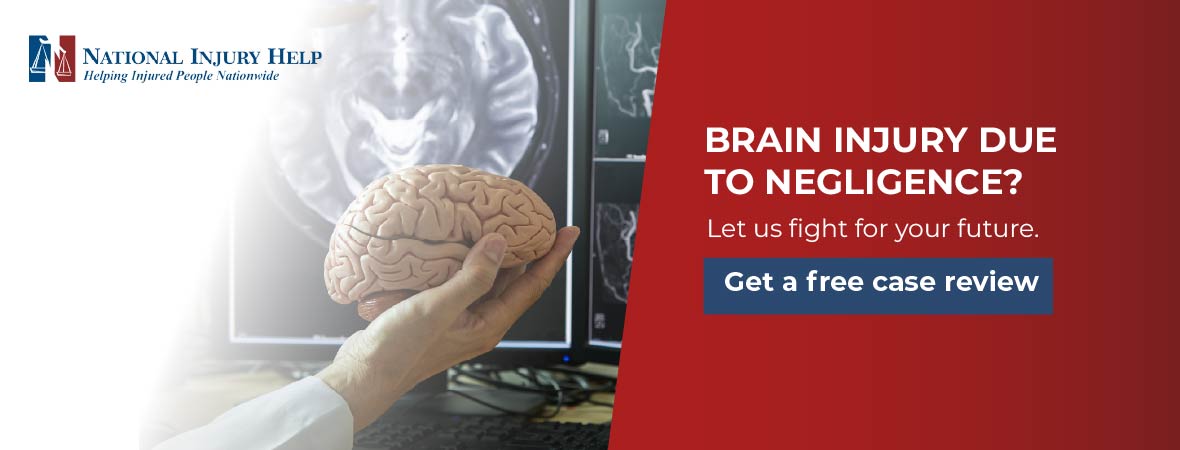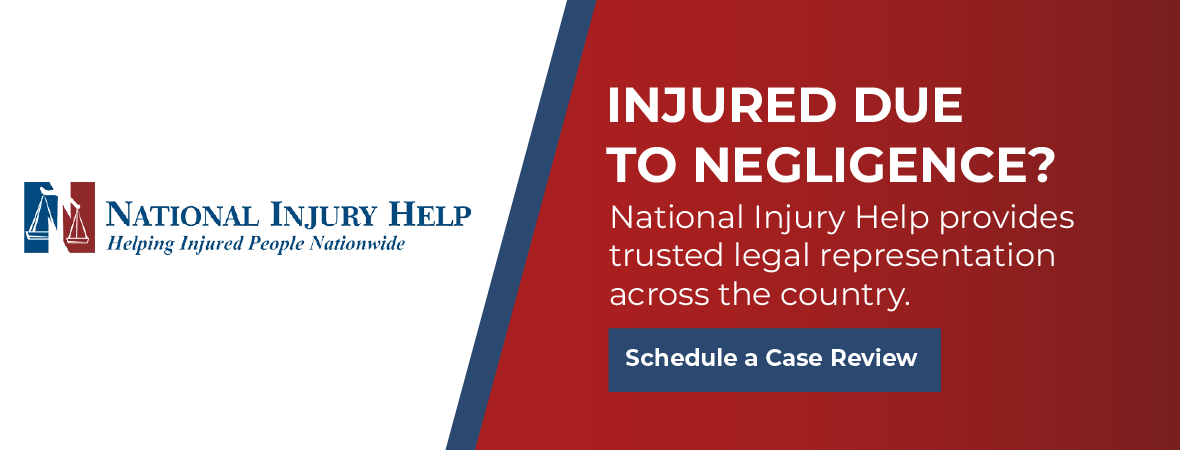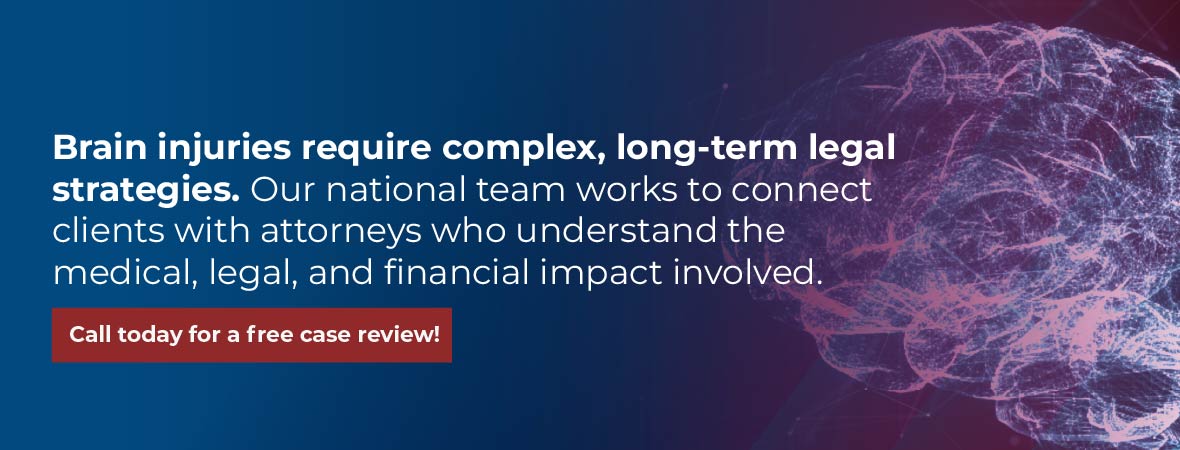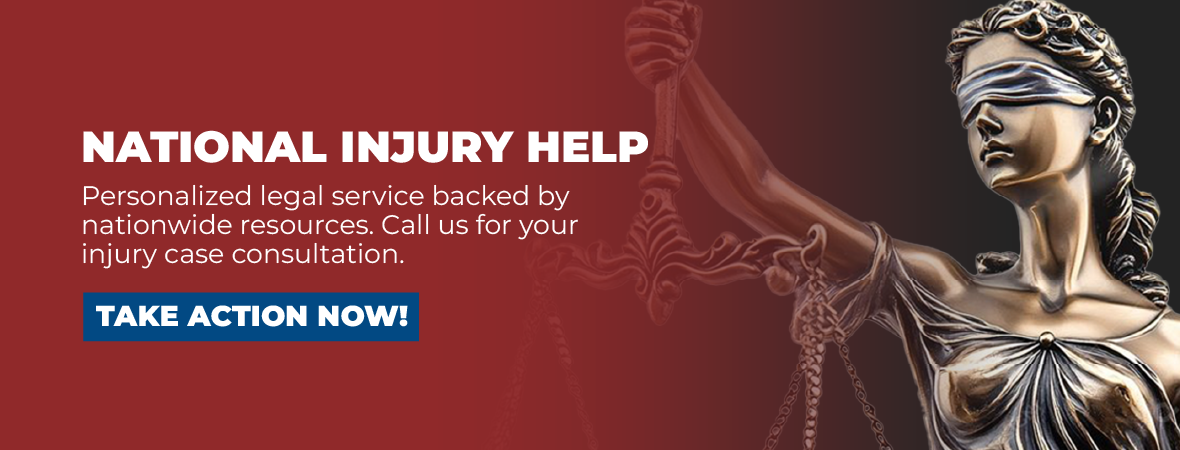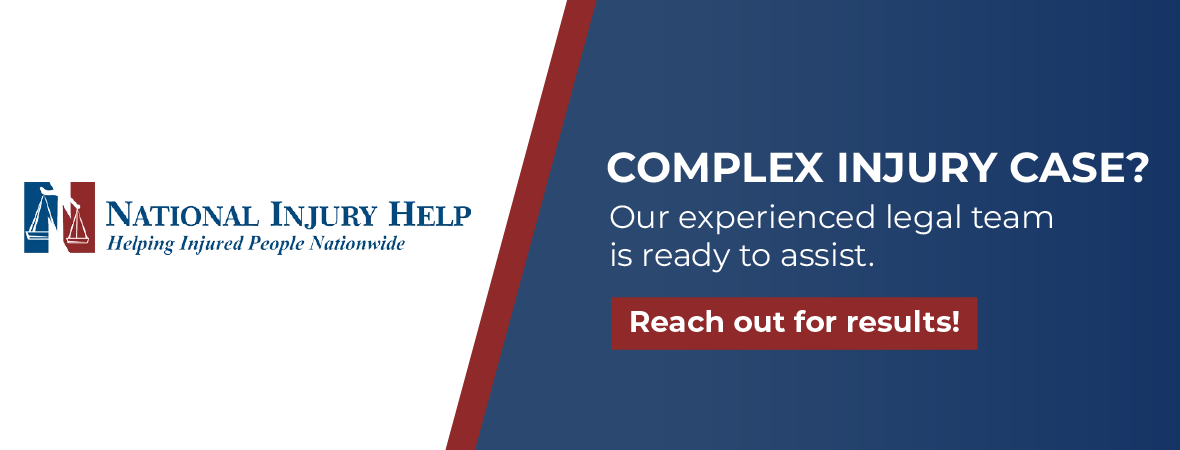At National Injury Help, we understand how injuries can change your life in an instant. If you or a loved one suffered a brain injury, call 1 (800) 214-1010. We are here to fight for your future.
Few injuries alter a person’s life as profoundly as brain damage. One moment, you or someone you love may be going about your day. The next, a sudden crash, fall, or impact brings about a traumatic brain injury that disrupts not only physical abilities but also memory, speech, behavior, and personality.
Even a so-called “mild” concussion can leave lasting confusion, emotional swings, or sleep problems. Severe traumatic brain injuries (TBIs) may lead to permanent disability or the need for around-the-clock care.
The brain controls every thought, movement, and emotion. When it is injured, the ripple effects are felt across every part of life. Hospital bills begin to stack up. Family members step into roles as caregivers. Jobs are left behind. Hobbies and independence are lost. In the middle of this, insurance companies often delay or deny claims.
Legal assistance may not be the first thing on your mind after a brain injury, but seeking guidance from an experienced brain injury attorney early on is often crucial. Legal action can help families secure the funds needed for medical treatment, therapy, assistive equipment, and future care.
Understanding Brain Injuries: Types and Symptoms
A traumatic brain injury happens when a sudden force disrupts the brain’s normal function. This might occur from a car crash, a fall, a sports collision, or even an act of violence. The brain may bounce inside the skull, nerves may be stretched or torn, and blood vessels may rupture.
There are two phases of injury: the primary damage from the initial impact and the secondary damage that happens over time due to swelling, bleeding, or lack of oxygen.
That is why someone may appear fine immediately after an accident but worsen in the hours or days that follow.
Common Types of Brain Injuries According to a Brain Injury Attorney
- Concussion: Often caused by whiplash or a blow to the head. It may lead to confusion, nausea, headaches, or light sensitivity. Repeated concussions can increase the risk of long-term conditions like chronic traumatic encephalopathy (CTE).
- Contusion: A bruise or bleeding on the brain. This can be dangerous if pressure builds up inside the skull, and surgery may be required to relieve it.
- Diffuse Axonal Injury (DAI): A serious form of injury where nerve fibers are torn due to rotational or shaking forces. This can lead to coma or long-term unconsciousness.
- Penetrating Injury: Caused by an object entering the skull, such as glass, bullets, or metal. These cases often require emergency surgery and may involve infection risks.
- Anoxic/Hypoxic Injury: Caused by a lack of oxygen to the brain. This may result from near-drowning, heart failure, or choking. Even a few minutes without oxygen can cause irreversible brain damage.
Symptoms of a Brain Injury
Symptoms vary depending on the type and severity of the injury, but common signs include:
- Headaches or migraines
- Memory loss or confusion
- Trouble speaking or finding words
- Balance problems or dizziness
- Mood swings, anxiety, or depression
- Light or sound sensitivity
- Fatigue and sleep issues
- Loss of smell or taste
- Seizures or fainting
Sometimes symptoms appear right away, and other times they take days to develop. That is why ongoing observation is critical. A daily journal of symptoms can help track the injury and provide strong evidence in a legal claim for brain damage.
Common Causes of Brain Injuries
Traumatic brain injuries can happen in many ways. The most common causes include:
Motor Vehicle Accidents
Car, truck, and motorcycle crashes are leading causes of TBIs. Sudden deceleration or impact throws the head forward and backward, even if the skull is not directly struck. Motorcyclists and bicyclists face higher risk, especially without helmets.
Falls
Falls are especially common among seniors and workers. They may occur on wet floors, broken steps, or icy sidewalks. Falls from ladders, scaffolding, or balconies can also cause serious brain injuries.
Sports and Recreation
Football, soccer, cycling, skiing, and contact sports increase the risk of head injury, especially in youth athletes. Schools and leagues have a duty to protect players through proper training, equipment, and rest periods after concussions.
Workplace Accidents
Construction sites, warehouses, and factories pose dangers from falling tools, unsafe equipment, or slips and falls. Employers must follow safety rules to prevent head injuries.
Violence
Gunshots, domestic abuse, shaken baby syndrome, and physical assault can all result in traumatic brain injuries. In these cases, victims may have both civil and criminal claims.
Legal Rights After a Brain Injury
When a brain injury is caused by someone else’s negligence or recklessness, the law gives you the right to file a personal injury claim. This is true whether the accident happened on the road, at work, on someone’s property, or during a recreational activity.
To succeed in a claim, your brain injury attorney must prove:
- Duty of care: The person or business had a responsibility to act safely.
- Breach of duty: That duty was violated through negligence or recklessness.
- Causation: The breach caused the brain injury.
- Damages: The injury led to medical bills, lost income, emotional suffering, or other losses.
These cases are complex. That is why it is important to work with a traumatic brain injury lawyer who understands both the medical and legal sides of the issue.
Types of Compensation an Experienced Brain Injury Attorney Can Secure for Victims
Brain injuries create both immediate costs and long-term financial burdens. Your legal claim may include compensation for both economic and non-economic losses. Here are the categories most often pursued in a TBI lawsuit:
Medical Expenses
- Emergency treatment and hospitalization
- Surgery, MRIs, CT scans, and lab tests
- Prescription medications
- Physical, speech, and occupational therapy
- Mental health counseling
- In-home nursing care
- Future medical costs for ongoing treatment
Lost Income and Earning Potential
If you cannot return to your job or need to switch careers, you may be entitled to:
- Lost wages from time off work
- Loss of future earning capacity
- Missed promotions or career advancement
- Pension and retirement benefits
- Vocational retraining
Head Trauma Compensation for Pain and Suffering
These damages account for the emotional and physical toll of the injury:
- Pain, discomfort, and chronic headaches
- Depression, anxiety, or mood disorders
- Loss of enjoyment of life
- Strained personal relationships
- Frustration over lost independence or function
Loss of Consortium and Family Impact
Spouses and children may receive compensation for:
- Loss of affection, intimacy, or partnership
- Emotional support that the injured person can no longer provide
- Parental guidance lost for minor children
Home and Lifestyle Modifications
- Wheelchair ramps and home remodeling
- Medical devices and adaptive technology
- Modified vehicles
- Transportation to and from appointments
- Assistance with cooking, bathing, and other daily tasks
Punitive Damages
In some cases, the defendant’s conduct was so reckless or intentional that the court awards punitive damages to punish them. Examples include drunk driving crashes or companies that ignored known safety risks. These awards are rare but can be substantial.
How Brain Injury Compensation Is Calculated
Economic losses are determined based on invoices, receipts, and expert assessments from medical providers, economists, and life care planners. Non-economic damages, such as pain and emotional distress, are more subjective and are frequently resolved by a jury.
A strong case includes:
- Detailed medical records
- Statements from doctors and therapists
- Expert reports on future care costs
- Testimony from family and friends
- Documentation of missed work and career impact
The right traumatic brain injury lawyer will coordinate all of this evidence, working with trusted specialists to build the strongest case possible.
Special Considerations in Children’s Brain Injury Cases
Children’s brains are still developing, so an injury can have long-lasting effects on learning, behavior, and emotional growth. In these cases, compensation must consider:
- Special education or tutoring needs
- Delays in speech or reading development
- Therapy for emotional and social challenges
- Future earnings lost if the child cannot work as an adult
- Medical costs that may extend for decades
Most states give children extra time to file a TBI lawsuit, often until they turn 18 or 20. However, it is best to begin legal action early, while evidence is still fresh.
Why You Need a Brain Injury Attorney
Unlike a broken bone that shows up clearly on an X-ray, a traumatic brain injury (TBI) is not always easy to see, even with scans.
This makes brain injury claims more complicated than many other types of personal injury cases. You need an attorney who not only understands the law but also understands the science and the human experience behind brain trauma.
Insurance Companies Often Try to Downplay Brain Injuries
One of the biggest challenges brain injury victims face is disbelief. Insurance companies may argue that your symptoms are temporary, exaggerated, or the result of something unrelated to the accident. They might blame stress, lack of sleep, or mental health, instead of recognizing the real impact of your injury. This is not only unfair, but it can also be financially devastating if it leads to a low settlement or outright denial.
A skilled brain injury attorney knows how to fight back against these tactics. They understand the complexity of brain injuries and have access to the right medical experts to help explain your condition in clear, factual terms.
What Your Attorney Will Do
Here’s how a brain injury lawyer helps build a strong case and protect your future:
- Investigate Quickly: Time matters. Your attorney will visit the scene of the incident, interview witnesses, collect accident reports, and secure any available video footage before it is erased or lost.
- Work With Medical Experts: Brain injuries require input from specialists. Your lawyer will work with neurologists, neuropsychologists, radiologists, and physical therapists to evaluate your condition and explain how it affects your life.
- Bring in Life Care and Vocational Experts: Some brain injuries affect your ability to work or require long-term care. An attorney may bring in life care planners to calculate the cost of future medical needs and vocational experts to show how the injury affects your earning potential.
- Handle Communication With Insurers: Your lawyer takes over all conversations with insurance companies so that you are not pressured into saying the wrong thing or accepting a low offer.
- Negotiate a Full and Fair Settlement: The goal is to get the compensation you need, not just now, but for the long road ahead. That means accounting for future care, lost income, pain and suffering, and any permanent disability.
- Prepare for Trial: If the insurance company refuses to offer a fair amount, your attorney will be ready to take your case to court. Strong trial preparation can also make the other side more likely to settle before trial begins.
You Don’t Have to Handle This Alone
Trying to manage a brain injury while also navigating insurance claims and legal forms is simply too much for one person. You and your family need to focus on healing, adjusting, and rebuilding your lives, not chasing down paperwork or arguing with claims adjusters.
Hiring a brain injury attorney lifts that burden. It gives you someone in your corner who knows how to fight, who understands what you are going through, and who can lead the legal process while you focus on recovery.
Most brain injury lawyers, including those at National Injury Help, work on a contingency basis. That means you don’t pay anything unless your case is successful. Your consultation is free, and there is no obligation to move forward unless you are ready.
What to Do After a Brain Injury
If you or a loved one has suffered a brain injury, knowing what to do next can make a real difference in your recovery and your legal claim. The steps you take right after the injury can help you get the treatment you need and the compensation you deserve.
Below are the four most important things you should do after a brain injury, along with extra guidance to help you stay safe, supported, and prepared for what lies ahead.
1. Get Medical Care Right Away
The first and most important step is to seek medical help immediately. Even if you feel “okay” or think the injury is minor, it is still essential to see a doctor. Brain injuries can be hard to spot. Symptoms may take hours or even days to show up.
A mild concussion can still affect memory, focus, and balance. More serious TBIs may involve bleeding inside the skull, swelling, or damage to brain tissue. If left untreated, these conditions can worsen quickly and may lead to permanent damage or death.
Going to the hospital or an urgent care clinic not only protects your health but also creates a medical record. This record is crucial if you decide to pursue a legal claim later. Without a diagnosis soon after the incident, insurance companies may argue that your injury happened somewhere else or was not serious enough to need compensation.
Be clear and honest with the medical team. Describe exactly what happened, any symptoms you’re feeling, and when they started. The more detailed you are, the better your doctors can assess the injury and provide appropriate treatment.
2. Follow Your Doctor’s Orders
Once you’ve been diagnosed, follow every recommendation your doctor gives you. That includes:
- Taking all medications as prescribed
- Attending follow-up appointments
- Getting imaging tests like CT scans or MRIs, if suggested
- Staying home from work or school if advised
- Avoiding physical or mental activities that could make symptoms worse
You might feel tempted to “push through” the pain or resume your normal routine too soon, especially if you have responsibilities like work or family. But returning to full activity too early can delay your recovery or cause the injury to get worse.
Also, failing to follow medical advice can hurt your legal case. Insurance adjusters may claim that you made your symptoms worse or that you’re not as injured as you say. This can reduce the amount of compensation you’re able to recover.
If your doctor’s instructions are unclear, ask questions until you understand what you need to do and why. And if your condition worsens, report new symptoms to your doctor right away. These updates help show the full picture of how your injury is affecting your life.
3. Document Everything
Brain injuries often affect memory, attention, and communication. That’s why it’s especially important to start documenting key details from the very beginning. These records not only help you stay organized, but they also serve as critical evidence if you decide to file a claim.
Here are the main things to document:
- Medical Records: Save every discharge paper, test result, referral, and prescription. These documents help show the timeline of your injury and the care you received.
- Receipts: Keep receipts for medications, medical equipment, travel to doctor visits, or anything else you pay out of pocket.
- Photos: If you have visible injuries such as bruises, swelling, or stitches, take clear photos. Also, take pictures of any property damage related to the incident, such as a crushed bicycle helmet or a dented car door.
- Symptom Diary: Write down what you feel each day. Include things like headaches, fatigue, dizziness, trouble concentrating, or mood changes. These notes help show how the injury affects your daily life and how long your symptoms last.
- Conversations: If you speak with your doctor, insurance adjuster, employer, or anyone else about your injury, write down what was said and when. Include names, job titles, and contact info if possible.
- Work and School Impacts: If you miss work, school, or other commitments, make a record of it. Ask your employer or HR department for letters confirming time off and any changes to your duties or schedule.
Organize these records in a folder or digital file so you can easily access them. If you hire a lawyer, these documents will be extremely helpful in building a strong case.
4. Talk to a Lawyer Early
After a brain injury, many people are hesitant to contact a lawyer. They may feel overwhelmed or unsure if they even have a case. But speaking with a personal injury lawyer early on can protect your rights and help you avoid costly mistakes.
Do not sign anything or accept any settlement from an insurance company without first getting legal advice. Insurance companies often offer quick payments that may seem generous at first, but they rarely cover the full cost of long-term treatment, lost income, or permanent disability.
An experienced brain injury attorney can:
- Explain your legal options in plain language
- Review medical records and other documents to understand the value of your case
- Identify who is legally responsible for the injury
- Handle communication with the insurance companies
- Fight for compensation for your medical bills, pain and suffering, lost wages, and future care
Lawyers who focus on brain injuries also know how to work with expert witnesses like neurologists, neuropsychologists, and life care planners. These professionals can testify about your condition and help calculate the lifetime costs of care.
Most personal injury lawyers, including those at National Injury Help, work on a contingency fee basis. This means you do not pay anything upfront. You only pay legal fees if your case is successful. Your consultation is free, so there’s no risk in reaching out for help.
Choosing the Right Brain Injury Lawyer
When you or someone you love suffers a traumatic brain injury (TBI), the stakes are incredibly high. These injuries can lead to lifelong consequences, including memory loss, difficulty speaking or moving, mood swings, chronic pain, and loss of independence. On top of the physical and emotional toll, there is often a mountain of medical bills, lost income, and uncertainty about what the future holds.
That’s why choosing the right lawyer is one of the most important decisions you can make. A traumatic brain injury case is not like a fender-bender or a minor slip-and-fall. It demands a deep understanding of both law and medicine. Your attorney needs to know how to prove long-term damage, calculate future costs, and push back against insurance companies that may downplay your condition.
Not every personal injury lawyer is equipped to handle a TBI case. You need someone with the right background, resources, and commitment to see your case through to the end. Below are key questions you should ask, and the answers you deserve, when hiring a lawyer to represent you or a loved one after a brain injury.
1. Have You Handled Cases Like Mine Before?
This may sound like a basic question, but it’s one of the most important. Not all injury lawyers have experience with traumatic brain injury claims. Some focus on car accidents involving whiplash or broken bones, but may have never handled a case involving a closed head injury or diffuse axonal trauma.
TBI cases often involve invisible injuries; there may be no scars, casts, or external wounds to show the seriousness of what the brain has endured. Your lawyer should know how to identify and explain those injuries to a judge or jury, using expert opinions and medical imaging. They should also be familiar with symptoms that emerge over time, like memory loss, speech difficulties, or emotional instability.
Ask for specific examples of similar cases they’ve worked on, including the types of accidents involved, the severity of the injuries, and the outcomes.
2. What Kinds of Results Have You Achieved?
Past success is not a guarantee of future results, but it can tell you a lot about a lawyer’s ability to navigate complex cases. Brain injuries often result in high-value settlements or verdicts due to the long-term effects on a person’s life. A strong lawyer will be able to show you a history of securing meaningful compensation for clients with similar injuries.
It’s also important to ask how those outcomes were reached. Did they come from negotiated settlements, mediation, or courtroom verdicts? This gives insight into how skilled the attorney is at both negotiation and litigation. Some lawyers never go to court, which might mean they’re more likely to accept a lower offer from the insurance company just to close the case quickly.
You deserve someone who is not just aiming for a quick payout, but who will fight for the full compensation you’ll need to support your care, future earnings, and quality of life.
3. Will You Take the Case to Trial if Needed?
Not every brain injury case ends up in court, but the threat of a trial is often what motivates insurance companies to make fair offers. If your lawyer is known for settling every case out of court, the insurance company may try to take advantage of that reputation by offering less than your claim is worth.
That’s why it’s crucial to ask your lawyer if they are prepared to go to trial, and how often they’ve done so in the past. A confident answer backed by real courtroom experience shows that they’re not afraid to take the case as far as necessary.
Trial experience also matters because presenting a brain injury case in court is incredibly complex. Your lawyer will need to explain to a jury how your life has changed, often using medical terms and expert testimony. The ability to make that information understandable and persuasive is a skill that only experienced trial lawyers possess.
4. Do You Work with Neurologists and Life Care Planners?
Winning a brain injury case is not just about proving that the injury occurred; it’s about showing how deeply it has changed your life. That’s where medical and financial experts come in.
Neurologists can provide detailed insight into the injury, from the initial trauma to long-term effects. Life care planners can help estimate the future costs of care, including home modifications, ongoing therapy, assistive devices, and lost earning potential. These expert assessments can add hundreds of thousands, or even millions, of dollars to a settlement or verdict when presented correctly.
Ask your potential lawyer if they already have relationships with these professionals. If not, they may not be fully prepared to prove the full value of your claim. The right attorney will work closely with respected specialists who can offer credible, evidence-backed evaluations of your injury and its impact.
5. How Will You Keep Me Updated?
Communication is one of the most overlooked, but most important, parts of the attorney-client relationship. Brain injury survivors and their families are often under incredible stress. You should not be left in the dark about what’s happening with your case.
Ask the lawyer how they handle communication. Will you get updates weekly, monthly, or only when something happens? Will you be speaking directly with your attorney, or only with paralegals and assistants?
You deserve someone who answers your calls, responds to your emails, and keeps you informed at every stage of the process. A good lawyer will make you feel respected and supported, not like just another file on the shelf.
Additional Qualities to Look For
Beyond these core questions, there are a few qualities that every brain injury lawyer should bring to the table:
- Compassion: The legal process can be stressful and confusing. Your lawyer should be patient, understanding, and genuinely invested in your recovery, not just the case outcome.
- Transparency: You should feel confident asking questions about fees, timelines, and legal strategies. A good attorney will be honest and upfront with you at all times.
- Resources: TBI cases can take months or even years to resolve. Your lawyer should work at a firm with the financial and personnel resources to pursue the case for as long as it takes.
- Reputation: Look for online reviews, peer recognition, and case results that speak to their credibility. A respected lawyer is more likely to be taken seriously by opposing counsel and insurance companies.
Contact a Brain Injury Attorney Today
A brain injury changes everything. It can interrupt your ability to think clearly, move freely, work, communicate, or even recognize loved ones. The effects are not just physical; they ripple through every part of your life, including your emotional health, relationships, and financial stability. Whether the injury was caused by a fall, car crash, sports accident, or violent impact, the aftermath is never simple. Recovery is often long and difficult, filled with doctor visits, therapy sessions, and unanswered questions about what comes next.
At National Injury Help, we understand what you are going through. You are not just dealing with an injury; you are facing the loss of the life you once knew. That is why our brain injury lawyers are here to support you every step of the way.
We combine deep legal experience with an understanding of the complex medical science behind head trauma. We know how insurance companies try to minimize brain injuries or delay payment, hoping you will settle for less. We don’t let that happen. Our team builds a strong case based on expert testimony, medical records, and a full picture of how the injury has affected your daily life and future.
We also know the last thing you need right now is another bill. That’s why your consultation is 100% free, and you pay nothing unless we win your case. No surprises. No hidden fees. Just a legal team that fights hard for the full compensation you deserve, whether that includes lost income, medical bills, long-term care costs, or emotional suffering.
If you or someone you love has suffered a brain injury, call 1 (800) 214-1010 today to speak directly with a skilled brain injury attorney. Whether you are seeking guidance, justice, or full financial support, we are ready to help. Let us fight for your future, so you can focus on healing.





